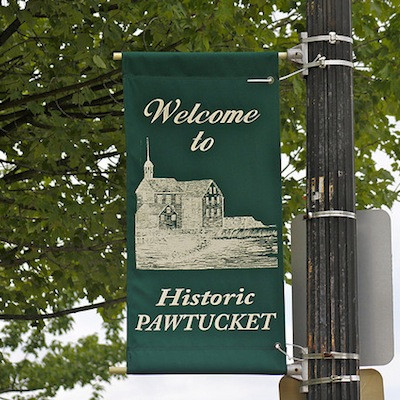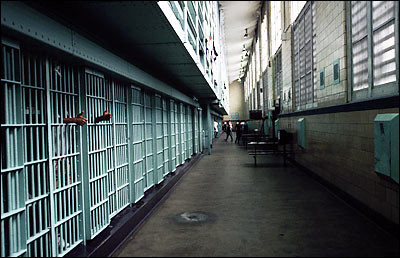PODCAST: RI Supreme Court’s Motto Taken from a Religious Persecutor
Thursday, March 05, 2015
GoLocalProv News Team and NewsRadio 920
The inscription above the bench of the Rhode Island Supreme Court, which affirms both the rule of law and sovereignty of God, is taken from a 17th century jurist noted for his lasting contributions to law but who also defended the practice of burning heretics and held that atheists lacked certain legal rights. Kate Nagle discusses today's big story with NewsRadio 920's Ron St. Pierre.
Related Slideshow: Religious Freedom Controversies in Rhode Island
The below slides summarize some of the biggest and most notable of freedom of religion and church-state cases and controversies in Rhode Island. They are roughly listed in order from newest to oldest. Where available, a court case citation is provided. Generally in instances in which there was a court decision or settlement, the case is listed by the date of that decision or settlement.
 View Larger +
View Larger +
Prev
Next
Chafee's 'Holiday' Tree
2011 to 2014
Description: Governor Lincoln Chafee ignited controversy when he described the Statehouse Christmas tree as a “holiday tree” in invitations his office sent out for its lighting in 2011—even though the term reflected the practice of past Governors. State Rep Doreen Costa, R-North Kingstown, held a Christmas tree lighting at her office in protest and pushed through a resolution declaring the tree a “Christmas” tree. Chafee stuck to his guns in the following year but eventually relented in 2013 and 2014, referring to it as a “Christmas tree.” Chafee said the controversy over the name generated too much anger and that no fundamental values of the state were at stake in the debate over the name.
Photo courtesy of Ken Zirkel
 View Larger +
View Larger +
Prev
Next
Gay Pride Parade
Theodore J. Fabrizio, Jr. v. City of Providence et al.
Stephen J. Deninno, Jr. v. City of Providence et al.
December 2014
Description: Two Providence firefighters sued then-Mayor Buddy Cianci in 2001, claiming that mandatory participation in a gay pride parade violated their Constitutional rights to freedom of religion, speech, and association. The firefighters, both Catholics, had argued that their religious beliefs barred them from condoning homosexual behavior. The case eventually made its way up to the state Supreme Court which, last year, decided against the plaintiffs.
The court reasoned that the firefighters had not had their rights violated because their participation in the parade could not be considered an act of personal expression. Instead, the firefighters were present “merely as relatively anonymous public servants,” the court concluded.
Read the Opinion.
 View Larger +
View Larger +
Prev
Next
Woonsocket War Memorial
2012
Description: In 2012, Wisconsin-based Freedom from Religion Foundation challenged the constitutionality of a war memorial on Woonsocket city property which had a cross affixed to its top. The criticism sparked a local backlash, prompting nearly 2,000 people to turn out in support of the memorial, which was for veterans of the two world wars. A number of public figures also expressed support for the memorial, including Bishop Thomas Tobin.
 View Larger +
View Larger +
Prev
Next
Pawtucket Athletic Fields
Rogers v. Mulholland
2012
Description: In 2009, the Rhode Island ACLU filed a lawsuit on behalf of several parents alleging that Pawtucket was offering preferential treatment to parochial schools over local public schools in the use of city athletic fields. A federal judge ruled in favor of the city in 2012.
Read the lawsuit.
 View Larger +
View Larger +
Prev
Next
Cranston Prayer Banner
Ahlquist v. City of Cranston
2010 to 2012
Description: In 2010, the Rhode Island ACLU contacted the Cranston School District, alerting it to a complaint it had received from a parent about a prayer banner in the auditorium at Cranston West High School, which the ACLU said was a clear violation of First Amendment rights and case law on school prayer. The prayer petitions “Our Heavenly Father” for kindness, honesty, friendship, and sportsmanship among students. When the school did not take down the banner, Jessica Ahlquist, a student at Cranston West High School, sued in 2011. Ahlquist eventually prevailed in court and the banner had to be taken down.
Read the lawsuit.
 View Larger +
View Larger +
Prev
Next
Prisoner Preaching Ban
Wesley Spratt v. A.T. Wall et. al.
2007
Description: Wesley Spratt, an ACI inmate, was barred from preaching at religious services held at the state prison in 2003, even though he had done so for seven years previously. Prison authorities cited security concerns in the ban. The Rhode Island ACLU sued in federal court in 2006 and reached a settlement the following year, allowing Spratt to resume his preaching.
Read the settlement.
 View Larger +
View Larger +
Prev
Next
Cranston Nativity Scene
Osediacz v. City of Cranston
2004
Description: The Rhode Island ACLU filed a federal lawsuit in 2003 on behalf of a Cranston resident who objected to the display of a nativity scene and a menorah on the lawn of city hall. A federal judge later upheld the constitutionality of the display but not the policy behind it, which gave then-Mayor Stephen Laffey the authority to decide what could be displayed. According to the ACLU, an appellate court later found that the plaintiff did not have standing to sue.
Read the lawsuit.
 View Larger +
View Larger +
Prev
Next
School Prayer Case
Lee v. Weisman
1992
Description: In 1992, the U.S. Supreme Court ruled that public schools may not invite clergy to deliver prayers—even if they are non-sectarian—at graduation ceremonies, declaring the practice a violation of the Establishment Clause of the First Amendment. The case arose after a parent tried to block a prayer by a rabbi at a graduation ceremony for a Providence middle school.
Read the Supreme Court decision.
 View Larger +
View Larger +
Prev
Next
Glocester Police Test
Tucker v. Glocester Police Department
1991
Description: According to the Rhode Island ACLU, the case opposed “questions relating to religious beliefs” on the “standardized psychologized test” given to police applicants. The case was favorably settled, according to the ACLU.
 View Larger +
View Larger +
Prev
Next
Wiccan Church Taxes
1990
Description: The Rhode Island ACLU challenged a state Division of Taxation ruling that a Wiccan church did not merit a tax exemption because it was deemed not to be a ‘legitimate’ religion, according to an ACLU summary of the case.
Related Articles
Enjoy this post? Share it with others.






















